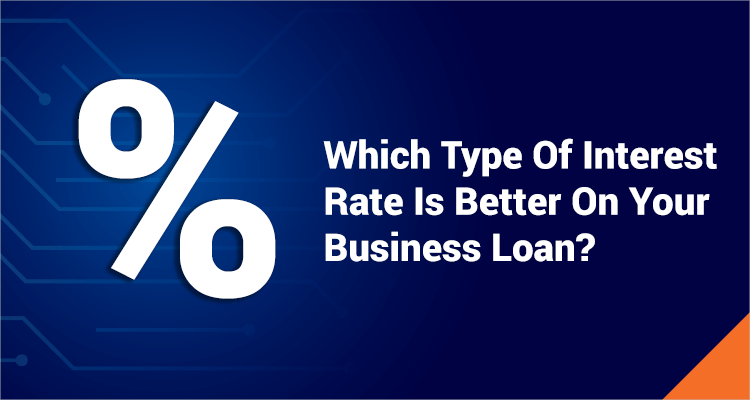Which Type Of Interest Rate Is Better On Your Business Loan?
Table of Contents
The interest rate is one of the most important factors to consider while taking a loan. This rate is the cost of borrowing that you need to repay with the principal amount. There are two types of interest rates: fixed rate and floating rate. This article explains these interest rate types and highlights the one that may be better for your business loan.
What Is A Fixed Interest Rate?
This type of interest rate is the fixed rate of interest you need to pay for the entire tenure of the loan. The rate does not change whatsoever during the loan period. A fixed interest loan involves a fixed payable monthly installment. A few reasons why a fixed interest rate can be beneficial as a business loan interest rate include:
• It helps you plan your budget more efficiently. With a fixed business loan interest rate, you are aware of your monthly fixed expenses and for the entire loan tenure.
• Your loan payment is not market-linked. Hence, any market fluctuation doesn’t affect your business loan.
• This type of loan accompanies a lower risk, especially for short-to-medium term loans of three-to-five years.
What Is A Floating Interest Rate?
A floating interest rate means you pay the prevailing loan interest rate. In this type of loan, your monthly outflow keeps changing throughout the loan tenure. A floating interest rate comprises two parts–a base rate (like LIBOR) plus a margin.
For instance, a lender may quote their floating rate LIBOR + 2%. If the LIBOR is at 7% this month, your interest rate becomes 9%. However, if LIBOR is 5%, your interest rate becomes only 7%. Therefore, the loan interest rate fluctuates as per the base rate change. A few reasons why a floating interest rate can be beneficial include:
• A lower interest rate can prevent a hole in your pocket.
• A lower interest rate can reduce the business loan tenure.
• Most financial institutions charge a comparatively lower floating rate than a fixed interest rate.
Sapna aapka. Business Loan Humara.
Apply NowWhich Type Of Interest Rate Is Better?
Choosing a type of interest rate depends on several factors:1. Risk:
Fixed interest rate brings the certainty of the cash outflow every month and a known total cost over the entire loan tenure. In the case of floating interest rates, the loan cost fluctuates and depends on the base rate.2. Market Conviction:
Most borrowers opt for a floating rate as they have particular predictions in mind about the base rate going down. To leverage such speculation, borrowers often turn to floating interest rates.Apply For A Business Loan With IIFL Finance
IIFL Finance is a leading instant business loan provider. We offer quick loans that are perfect for MSMEs with small financial requirements up to INR 30 lakh. You can check the business loan interest rate at your nearest IIFL Finance branch or online.The entire process, from application to disbursement, is 100% online. The disbursals are quick and take 24-48 hours. You can fulfill various business needs and repay them per your preferred cycle. Apply for an IIFL Finance business loan today!
Frequently Asked Questions
Q.1: What is the difference between fixed and floating interest rates?
Ans: The primary distinguishing factor between a fixed and floating interest rate is that the former is fixed over the loan tenure. The latter is dependent on a base rate fluctuating over the loan tenure. The total cost is known in the fixed interest rate loan, but it’s uncertain for a floating interest rate loan.
Q.2: Which interest type rate is better for a business loan?
Ans: It depends on the business requirements and the conviction of the borrower if they want to play safe with a fixed interest rate or take a risk with a floating interest rate. Also, borrowers opt for a floating rate when they speculate floating rate is more beneficial than a fixed interest rate.
Sapna aapka. Business Loan Humara.
Apply NowDisclaimer : The information in this blog is for general purposes only and may change without notice. It does not constitute legal, tax, or financial advice. Readers should seek professional guidance and make decisions at their own discretion. IIFL Finance is not liable for any reliance on this content. Read more




